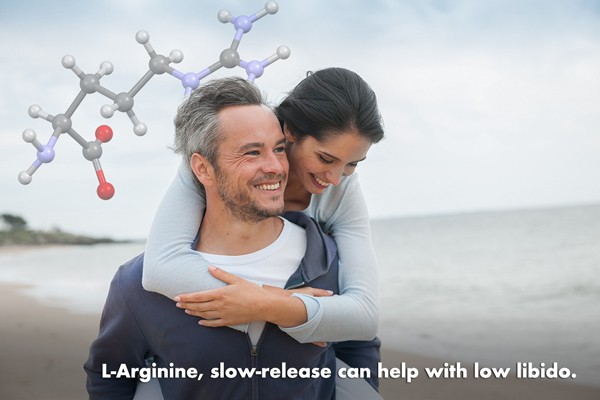For LOW LIBIDO, the amino acid L-arginine can boost frequency of desire and enhance sexual interest for men by increasing dopamine levels in the brain. Five distinct neurotransmitters work together to increase sexual arousal: norepinephrine, dopamine, serotonin, acetylcholine, and histamine. L-arginine inhibits the enzyme nitric oxide synthase, leading to greater release of dopamine. Most researchers endorse the hypothesis that increased dopamine levels play a crucial excitatory role in sexual arousal in males, while serotonin has an inhibitory action.1,2
 Dopamine has a central role in multiple areas of arousal including: sexual motivation, copulatory proficiency, and genital reflexes. Additionally, steroid hormones prime neural circuits for sexual behavior and libido, in part by regulating enzymes and by enhancing levels of dopamine, which facilitates male sexual behavior.
Dopamine has a central role in multiple areas of arousal including: sexual motivation, copulatory proficiency, and genital reflexes. Additionally, steroid hormones prime neural circuits for sexual behavior and libido, in part by regulating enzymes and by enhancing levels of dopamine, which facilitates male sexual behavior.
L-arginine also enhances blood flow to erectile tissues: For men libido is known to rise when erectile function is stronger. Confidence in his potency encourages a man’s libido. In addition, L-arginine can boost testosterone levels, and this hormone further supports a healthy libido.
L-arginine is a semi-essential amino acid, meaning that it can be produced by the body, but its production depends on many different factors such as age, mental or physical stress. A number of health situations require higher amounts, so L-arginine can be classified as a conditionally essential amino acid, depending on the developmental stage and health status of the individual. Though adult bodies make some arginine, and small amounts are found in nuts, seeds, and legumes, it needs to be consumed through supplementation to reach adequate levels to benefit libido and male sexual functions. L-arginine was first isolated from a lupin plant seedling extract in 1886 by the Swiss chemist Ernst Schulze.
As one most metabolically versatile amino acids, L-arginine serves as a precursor for the synthesis of urea, nitric oxide, polyamines, proline, glutamate, creatine, and agmatine. Partly due to its protein building ability, L-arginine can cross the blood-brain barrier and reach the brain tissues and hypothalamus–something that most other medications and supplements cannot do. L-arginine increases dopamine transporter activity, and it can thus improve dopamine levels. Studies indicate that L-arginine does this via a nitric oxide synthase-dependent mechanism.3
Researchers state that a healthy libido is achieved “by enhancing the processing of relevant sensory stimuli, altering the synthesis, release, and receptors for neurotransmitters in integrative areas, and increasing the responsiveness of appropriate motor outputs. Dopamine in the nigrostriatal tract influences motor activity; in the mesolimbic tract it activates numerous motivated behaviors, including copulation; in the medial preoptic area it controls genital reflexes, copulatory patterns, and specifically sexual motivation.”4 This means that dopamine has a hugely significant role in triggering a man’s desire for intimate contact, and supporting the body’s physical sexual responses including erection and attaining sexual intercourse. Dopamine also stimulates ‘motivated behaviors,’ the carrying out of sexual behavior that results from higher libido.
In our clinic, men using L-arginine for libido report steadily increasing desire after 3 to 6 months of daily use. Each nitric acid molecule produced by the body or from supplemental L-arginine is rapidly metabolized, so blood levels drop fast: We therefore recommend a sustained-release L-arginine preparation, in a base of slow-release methylcellulose, to maintain ample tissue levels of L-arginine over 24 hours with just 500mg two times daily.
Recommendation: L-arginine in a base of slow-release methylcellulose, 500mg two times daily, with or between meals; or as directed by your healthcare provider.
References
- Chauhan, Nagendra Singh, et al. “A review on plants used for improvement of sexual performance and virility.” BioMed research international 2014 (2014).
- Kapp B, Cain M. The neural basis of arousal. In: Smelser N, Baltes P, editors. The International Encyclopedia of Social and Behavioral Sciences. Oxford, UK: Elsevier Science; 2001.
- Volz, Trent J., and James O. Schenk. “L‐arginine increases dopamine transporter activity in rat striatum via a nitric oxide synthase‐dependent mechanism.” Synapse 54.3 (2004): 173-182.
- Hull, Elaine M., John W. Muschamp, and Satoru Sato. “Dopamine and serotonin: influences on male sexual behavior.” Physiology & behavior 83.2 (2004): 291-307.
- Hull, Elaine M., et al. “Testosterone, preoptic dopamine, and copulation in male rats.” Brain research bulletin 44.4 (1997): 327-333.